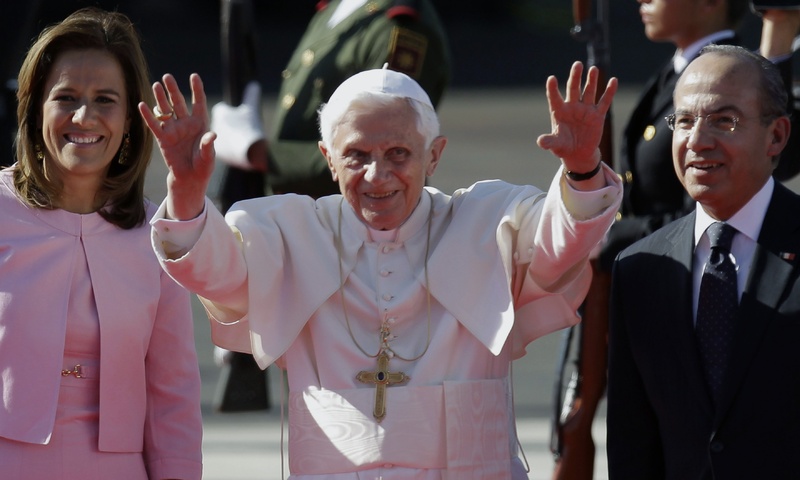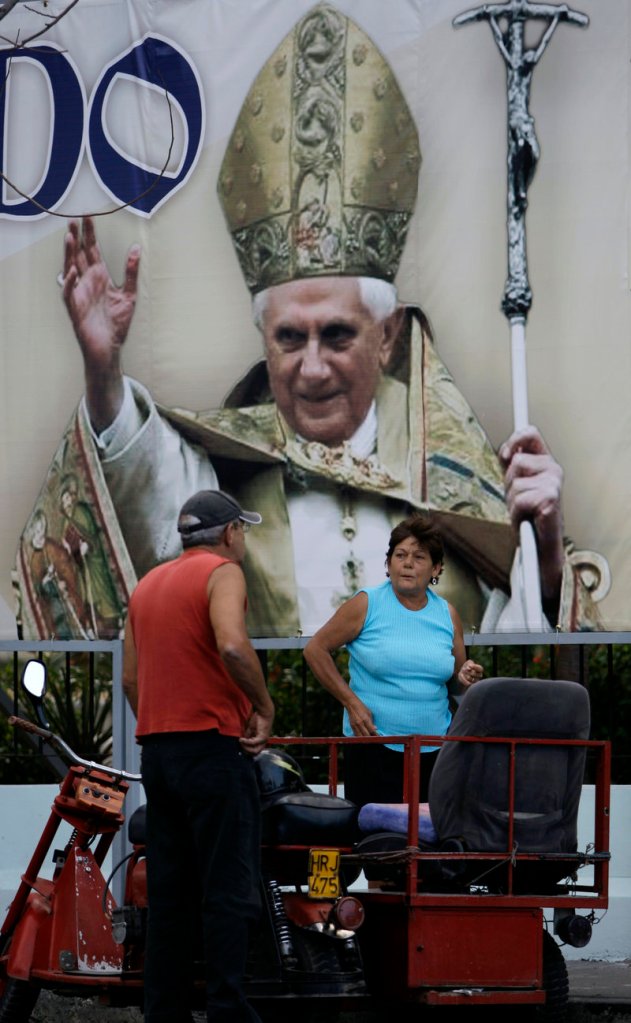SILAO, Mexico – Pope Benedict XVI began a pilgrimage to Latin America on Friday, calling on Mexicans to conquer an “idolatry of money” that feeds drug violence and urging Cuba to leave behind a Marxism that “no longer responds to reality.”
Mexican President Felipe Calderon and first lady Margarita Zavala greeted the pope and escorted him along a red carpet amid a clanging of church bells and cheers from a crowd waving Vatican flags. A swelling throng gathered to cheer him along his path from the airport on his first visit to Spanish-speaking Latin America.
“Benedict, brother, you are now Mexican,” people shouted from the crowd.
He descended the stairs without the cane he had used when he walked to the plane in Rome, the first time he had walked with it in public.
Upon his arrival, Benedict referred again to the everyday violence that ordinary Mexicans confront, saying he was praying for all in need “particularly those who suffer because of old and new rivalries, resentments and all forms of violence.”
He said he was coming to Mexico as a pilgrim of hope, to encourage Mexicans to “transform the present structures and events which are less than satisfactory and seem immovable or insurmountable while also helping those who do not see meaning or a future in life.”
After the Alitalia plane carrying the pope landed, the streets of Leon took on a carnival atmosphere as the crowds and their enthusiasm grew steadily. Police blocked traffic on the central boulevard the pope would travel, and people lined up three and four deep on both sides of the avenue. Everyone stopped to watch the arrival on restaurant and shop televisions.
“Mexico is standing because we’re a country that perseveres with hope and solidarity, we’re a people with values and principals that believe in family, liberty, justice and democracy,” Calderon said in a speech on the tarmac to cheers of “Viva!” from the crowd. “Your visit fills us with joy in moments of great tribulation.”
Benedict acknowledged the historic nature of Pope John Paul II’s first trip to Mexico — the first by any pope. The 1979 visit, just months after being elected pope and his first foreign trip, came at a time in which Mexico’s anti-religion laws were so restrictive that John Paul was technically breaking the law by wearing clerical garb in public.
Mentions of John Paul by the president and Benedict brought cheers.
John Paul also made a historic visit to Cuba in 1998, where upon his arrival in Havana he pronounced the now-famous words: “May Cuba, with all its magnificent potential, open itself up to the world, and may the world open itself up to Cuba.”
Benedict told reporters those words remain true even today, and that John Paul’s visit had launched a path of “collaboration and constructive dialogue” that continues, albeit slowly.
On Monday, Benedict will head for Cuba. He said it is “evident that Marxist ideology as it was conceived no longer responds to reality,” and he urged Cubans to “find new models, with patience, and in a constructive way.”
The comment about Marxism, in response to questions from a journalist, was as blunt as anything his predecessor, John Paul II, made during his groundbreaking 1998 trip to Cuba, although the earlier pope is widely credited with helping bring down socialism in eastern Europe.
Benedict cautioned that “this process requires patience and also decisiveness.”
Asked about reports that dissidents in Cuba are still routinely harassed and arrested, including in the weeks leading up to his visit, Benedict said that the church wants “to help in the spirit of dialogue to avoid trauma and to help bring about a just and fraternal society, as we want in the whole world.”
“We want to collaborate in this sense, and it’s obvious that the church is always on the side of freedom, freedom of conscience, freedom of religion,” the pope said.
Benedict said John Paul’s visit to Cuba ushered in a slow process of dialogue and cooperation between church and state on the island.
During that trip, John Paul made a clear if cautious call for then-President Fidel Castro to open up Cuban society, take steady if gradual steps toward democracy and give the church a greater voice. He also called for the release of political prisoners while giving Castro what he wanted, a condemnation of the U.S. embargo.
Asked about Benedict’s statement, Cuban Foreign Minister Bruno Rodriguez said the government respects all opinions. “We consider the exchange of ideas to be useful. Our people have deep convictions developed over the course of our history,” he said.
He added that the Cuban system “is a democratic social project … which is constantly perfecting itself.”
In Mexico, Benedict said, violence is destroying the nation’s young.
The “great responsibility of the church is to educate the conscience, teach moral responsibility and strip off the mask (from) the idolatry of money that enslaves mankind, and unmask the false promise, this lie that is behind” the drug culture, he said.
It is a message that Enrique Abundes, one of thousands lining the papal route, was waiting to hear. The 46-year-old shoe-factory worker and father of five said he believed Benedict would inspire Mexicans to keep their children away from the temptations of organized crime.
“The pope’s visit to our city will call attention to the violence and, for us, to be good examples to our children,” he said.
The weeklong trip to Mexico and Cuba, Benedict’s first to both countries, will be a test of stamina for the pope, who turns 85 next month.
At the airport Friday in Rome, the pope used a cane to walk about 100 yards to the airliner’s steps.
Papal aides said Benedict has been using the cane in private for about two months because it makes him feel more secure, not for any medical reason.
Copy the Story Link
Send questions/comments to the editors.




Success. Please wait for the page to reload. If the page does not reload within 5 seconds, please refresh the page.
Enter your email and password to access comments.
Hi, to comment on stories you must . This profile is in addition to your subscription and website login.
Already have a commenting profile? .
Invalid username/password.
Please check your email to confirm and complete your registration.
Only subscribers are eligible to post comments. Please subscribe or login first for digital access. Here’s why.
Use the form below to reset your password. When you've submitted your account email, we will send an email with a reset code.